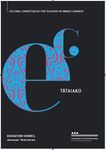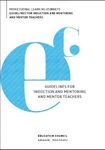Start-up information -PCTs 2021 - University of Otago
←
→
Page content transcription
If your browser does not render page correctly, please read the page content below
Start-up information –PCTs 2021 This resource is intended to help you find the most useful information to support you in creating your induction and mentoring programme and gaining full certification. We provide ongoing professional learning and development (PLD) that you as a PCT and your mentor can access across the country. You can register for this through our website: http://www.otago.ac.nz/PCT Information about workshops and other support. Education Support Services, University of Otago Page | 1
ePCT online modules
You can find information about ePCT on our website.
To register go to www.essepct.co.nz click on e PCT Login, register using the join code Primary or
Secondary.
The online modules provide opportunities for individualised/personalised learning. If you have just
started and are in need of some support to understand the provisional to full certification process,
then we recommend that you start with the following modules:
Under Requirements for Full Certification:
- Requirements for full certification
- Code and Standards
- Introduction to High Quality Induction and Mentoring
These modules will give you an overview of what is required.
Our Contacts
Our National Office at essadmin@otago.ac.nz
Our National Coordinator, Joan Turner, joan.turner@otago.ac.nz
Education Support Services, University of Otago Page | 2Useful documents
The Teaching Council) website https://teachingcouncil.nz/ : is a place you need to get familiar with.
Currently this is where to find things: Application for a full
practising certificate
Click into this section is done in this space
We suggest
you read
this section
carefully
and also
click on the
FAQs
featured on
that page
Education Support Services, University of Otago Page | 31. Registration Policy - The information on how to transition to Tūturu (or Full
– Category One) on P15-17. Download the policy from the Teaching Council
website or download a PDF here.
2. Our Code, Our Standards - As this document guides both teacher
professional behaviour and practice, it is an essential resource for discussions
about what that looks like in both what we as teachers do and in the context
of our school.
Our code describes our professional responsibilities. It is important that both
mentors and PCTs know what that means in the context of your school.
Teaching Standards will be a central document in your I & M programme.
Talk to your mentor about how they are used in your school. Download a
copy here.
3. Tātaiako – Cultural Competencies for Teachers of Māori learners. The
competencies are an important lens through which we look at the Teacher
Standards, in many schools. Download a copy here.
4. Tapasā – Cultural competencies framework for teachers of Pacific learners.
Again a lens through which to view the Teacher Standards. Many schools use
this as a lens. Download a copy here.
5. Guidelines for Induction and Mentoring and Mentor Teachers (2011) – Our
most current resource for understanding what quality induction and
mentoring is. The appendices ‘Educative Mentoring in Practice’ and ‘High
Quality, Intensive Induction and Mentoring’ give examples and direction. An
update of this document is planned. Download a copy here.
6. Hapori Matatū – this is the community forum part of the Teaching Council
website where teachers:
• network with other teachers
• update your details (when moving or changing emails etc)
• renew or upgrade your teacher certification
To access this section of the website you use your ‘Education Sector Login’ (ESL) and need to be
verified by your professional leader. The following link may be useful.
Education Support Services, University of Otago Page | 47. Matatū - the Teaching Council puts out this regular newsletter which is a great way to keep
updated about changes happening in the Induction and Mentoring space. To subscribe to
Matatū click on the profile icon (top right hand corner of Hapori Matatū home page), scroll to
‘Contact Details’ and ensure ‘Communication Preferences’ reads ‘All’.
Components of a broadbased Induction & Mentoring
programme for PCTs
An overview of what an effective induction and mentoring programme aims to
achieve and the key components it should include can be found here.
What if my school does not have a programme and documentation
requirements?
Most schools will have a system for PCT but it’s useful to work alongside your mentor and/or senior
leader to agree what must be done. Check you have appropriate documentation that is meaningful
and not just compliant. We have assembled a range of templates and examples that you and your
school might use to fill gaps. It is not expected that anyone would use all of these – there are several
formats so there is choice. Aim to make choices that avoid doubling up on recording tasks.
View and download these resources here.
Links to videos on how to collate your evidence using the Google platform:
http://bit.ly/googledrive4PCTs - using google drive (6 minutes)
http://bit.ly/googlesites4PCTs - using google sites (7 minutes)
http://bit.ly/blogger4PCTs - using blogger (8 minutes)
Final word
• You are not expected to know everything
• The best way to learn is to be a learner – be curious and ask lots of quality questions
• Find many people you can learn from
• Develop networks - others who have various expertise and different ideas from your own
Education Support Services, University of Otago Page | 5You can also read
























































